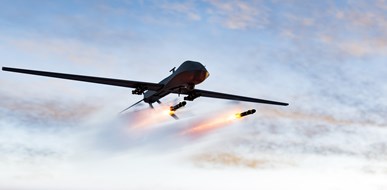[New publication] Jonathan Kwik discusses the use of autonomous weapon technologies
Published 24 October 2024
Photo: iStock
Asser Institute’s researcher, Dr Jonathan Kwik’s new book explores the practical and legal challenges of deploying autonomous weapon systems (AWS) in the context of quickly advancing artificial intelligence (AI). AI, once a more unknown technology, is now inextricably woven into our daily life, and influences everything from online services to law enforcement, and media.
In the military domain, AI’s role has become increasingly prominent. States highlight AI for strategic and tactical advantages, investing heavily in its development. Recent conflicts, such as the war in Ukraine and the Israel-Gaza conflict, demonstrates AI’s use in data analysis, autonomous targeting and missile interception.
Kwik’s book provides practical guidance for commanders on using AWS while ensuring compliance with international humanitarian law (IHL). It addresses how to adapt existing targeting frameworks to maintain control over AWS and make informed deployment decisions. The book also discusses legal constraints on AWS use, including rules on indiscriminate attacks and proportionality, and suggests unique precautionary measures to mitigate risks. Furthermore, it considers the circumstances under which AWS might be preferable to other alternatives and explores potential criminal liability for harm caused by AWS.
This book bridges legal theory and operational practice, offering insights and actionable recommendations. It invites readers to assume the role of a frontline commander faced with the urgent decision of whether to deploy an autonomous weapon. With limited time and incomplete knowledge, how should they proceed, and what ensures responsible use? Combining law, technical expertise, and operational art, this book offers a practical examination of military AI for those making life-and-death decisions in real time.
You can buy or read the book here.
About Jonathan Kwik
Jonathan Kwik is a researcher in international law at the Asser Institute attached to the ELSA Lab Defence project. His specialisation is in the laws governing the conduct of hostilities and artificial intelligence (AI). He currently sits as a member of the Board of Experts of the Asia-Pacific Journal of International Humanitarian Law (APJIHL). He is an academic partner of the International Committee of the Red Cross (ICRC) and has worked together with the ICRC on many occasions in matters of research, policy discussions, and dissemination events.

